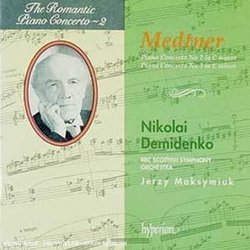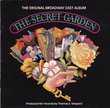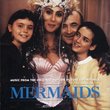| All Artists: Nikolay Medtner, Jerzy Maksymiuk, Glasgow BBC Scottish Symphony Orchestra, Nikolai Demidenko Title: Medtner: Piano Concerto No. 2; Piano Concerto No. 3 Members Wishing: 0 Total Copies: 0 Label: Hyperion UK Release Date: 3/4/1993 Album Type: Import Genre: Classical Styles: Forms & Genres, Concertos, Instruments, Keyboard, Symphonies Number of Discs: 1 SwapaCD Credits: 1 UPC: 034571165806 |
Search - Nikolay Medtner, Jerzy Maksymiuk, Glasgow BBC Scottish Symphony Orchestra :: Medtner: Piano Concerto No. 2; Piano Concerto No. 3
 | Nikolay Medtner, Jerzy Maksymiuk, Glasgow BBC Scottish Symphony Orchestra Medtner: Piano Concerto No. 2; Piano Concerto No. 3 Genre: Classical
|
Larger Image |
CD DetailsSimilarly Requested CDs
|
CD ReviewsSpectacular performances of wonderful music Steven Eldredge | New York, NY USA | 03/09/2005 (5 out of 5 stars) "Of all the entries in the ever-growing Hyperion Romantic Piano Concerto Series, it is the second installment that was the biggest revelation to me, in the form of the Second Piano Concerto by Nikolai Medtner. A big, glittering virtuoso piece, it has so much depth of emotion, so many secrets, so many moments of aching beauty, one despairs that so few audiences have had a chance to hear it. Think of the big Rachmaninov ( to whom Medtner dedicated the piece) concertos, with some of their heart-on-sleeve Russianess tempered by a Brahmsian discipline of counterpoint and development, and you have the tiniest idea of what Medtner's concerto is like. Nikolai Demidenko's performance is spectacular. Blazing when needed, meltingly lyrical and velvety at other times, he seems to have penetrated Medtner's idiom to the core. At times the performance has a drive that takes the breath away. Jerzy Maksymiuk and the BBC Scottish Orchestra provide magnificent accompaniment. I find myself drawn to these pieces, in particular the Second Concerto quite often. I am always hearing new things to admire in them. Unreservedly recommended. " Medtner's 2nd and 3rd are both Impeccable Alscribji | Washington, D.C. | 11/10/2004 (5 out of 5 stars) "Upon first listening to this CD I was sold on Medtner's 2nd and 3rd concertos. The 2nd concerto is a fine piece of music, unparalleled in the concerto repertoire for its drive and structure. The ambitious solo cadenza in the first movement of the 2nd concerto is moody, powerful, and sizzling. Chords scream and left-handed flourishes roll. The solo cadenza rivals that of two other such cadenzas: Rachmaninoff's solo cadenza in the first movement of his 3rd concerto and Prokofieff's solo cadenza in the first movement of his 2nd concerto. Mednter's is the most mature of the three cadenzas, both musically and intellectually. Prokofieff's, although spine-tingling when played by capable hands, is probably the least mature of the three cadenzas. As with Medtner's music, it takes several listenings to get into the music and follow it. Upon repeated listenings to the 3rd concerto new things begin to emerge, and they are gems of composition. This piece is not only craftily structured and written, the music itself, the themes, harmonies, melodies, is simply good music. The performance by Demidenko is riveting and technically superior. The concertos in the Hyperion series, 'The Romantic Piano Concerto,' are sometimes wanting. Little wonder some have never been recorded before. But the Mednter concertos in this series, especially the 2nd and 3rd, are pieces worth owning on CD. Demidenko and Maksymiuk are really stupendous on this CD. The recording production is sometimes a little 'muddy' sounding. At times, it sounds as if the sound is straining to get out of your speakers. Otherwise, the CD is a gem. Get it." Beautiful late romantic music and magnificent performance caspi | Israel | 07/12/2002 (5 out of 5 stars) "This CD presents us the 2 last piano concertos by Nikolai Medtner.All 3 Medtner's concertos, althogh having a lot of stylistic similarities, differ one from each other a lot. For me the most distinctive features of them are the form integrity in The First, variety of colours and thematic material alongside with virtuoso piano writing in The Second and the wisdom of the music in the Third, as if Medtner delivers in it an essence of the whole life experience smiling at the same time.All of the concerts strike you by the elegance of the music and it's power, beatiful piano writing and the dialogues between the piano and the orchestra, refined, bright melodies in Russian tradition and their rich polyphonic development close to the German school. And of course, the endless beauty streaming out of the music.While listening to the CD each time I try to understand who feels the music better: the composer who wrote it, Nikolai Demidenko who seems to put all his head, heart and soul in it, or both of them ? I don't see any better performance for this music. Powerful playing, the richest sound, high class technique, deep and delicate understanding of the music.I'd like to mention also the wonderful job of the orchestra and the superb recording quality - particularly the piano, it's sound is luxurious.Highly recommend this CD together with another one in Hyperion serie "The Romantic Piano Concerto" containing The First Piano Concerto and Piano Quintet of Medtner interpreted by another outstanding pianist - Dmitry Alexeev."
|

 Track Listings (6) - Disc #1
Track Listings (6) - Disc #1


![The Music Man (1957 Original Broadway Cast) [Angel Reissue]](https://nationalbookswap.com/cd//m/02/4802/84802.jpg)




